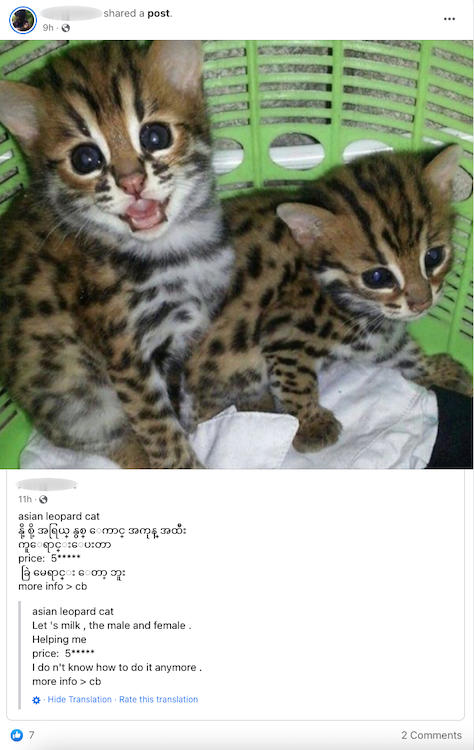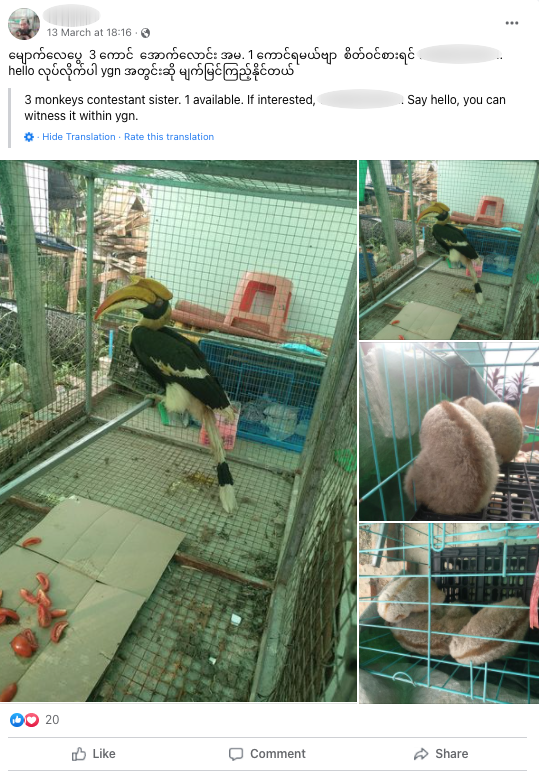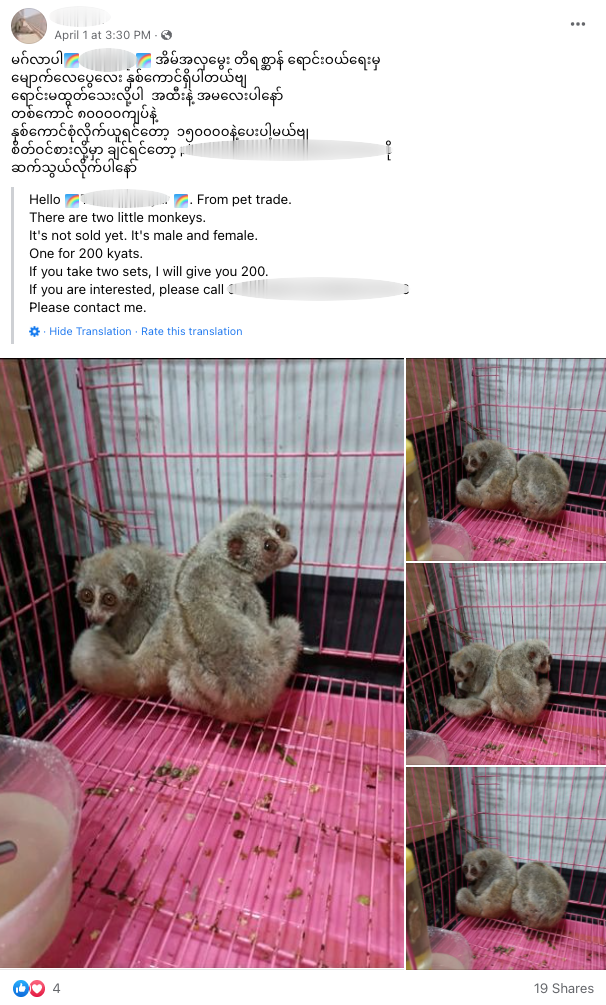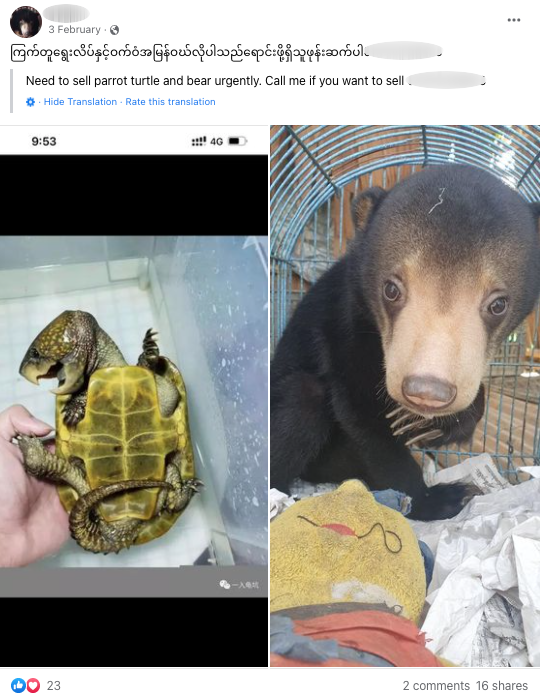VICE World News has chosen not to name any of the sellers or groups mentioned in this story. No money was exchanged or transactions agreed.The hardest part of buying a tiger would have been getting to the pickup spot. The trafficker said he’d only deliver to Yangon, Myanmar’s biggest city and major port—but if someone could meet him there he’d sell them one of the world’s largest cats for the equivalent of $29,000.
Advertisement
“If the price is right, you get it,” he said through a voice note in Burmese, a parrot screeching in the background, after VICE World News found him advertising his wares on a public Facebook group. “When we meet up in Yangon, we will make payment in cash. If you confirm and we have the tiger, I will call you.”It took just half a dozen messages and less than 24 hours to line up the deal. Thanks to Facebook, it’s about as easy to find someone selling an endangered jungle cat as it is to adopt a domestic shorthair.Other specimens, including some of the world’s most critically endangered species, are even more easily obtainable. Within three days, using nothing but public Facebook groups and Messenger, VICE World News was also able to track down and all but execute the purchase of an Asiatic black bear ($1,000), two leopard cat cubs ($280 for both), a wolf ($67) and a slow loris ($45)—a species of vulnerable primate that is often illegally traded as an exotic pet or for traditional medicine.Both the bear and the wolf, according to their respective dealers, could be picked up in Myawaddy, a small border town and trading point between Myanmar and Thailand. The leopard peddler, meanwhile, promised international delivery—as long as the buyer was willing to pay full freight.“I can send wherever you want,” he said, “but you just need to spend enough money for that.”With Myanmar’s military coup 18 months ago ushering in a new era of political upheaval and economic collapse, the illegal trade in wild animals and their body parts has exploded on the country’s social media. A report released last week by the World Wildlife Fund (WWF) found that in 2021, the number of wildlife items for sale on Facebook increased 74 percent, while the number of identified traders selling them rose by 69 percent. The amount of wild animal species on offer increased by a fifth, nearly a third of which were threatened with global extinction—including elephants, bears, gibbons, hornbills and critically endangered pangolins, the world’s most heavily trafficked mammal.
Advertisement

Efforts this week showed how quickly and easily an individual can acquire some of these specimens—either alive or dead—and the ways in which the world’s biggest social media platform is facilitating the trade and slaughter of critically endangered species. Despite international restrictions and Facebook’s own pledge to crack down on wildlife trafficking online, many of these animals are being shamelessly advertised, solicited, bought and sold in a number of seemingly unregulated groups across the social media platform, in plain view and easily accessible to its 2.9 billion global users.“This lack of secrecy suggests the trade on Facebook remains largely risk-free, thanks to the anonymity Facebook offers to sellers and buyers, and the limited capacity of Myanmar authorities to control the trade,” the authors of the WWF report noted. Moreover, they added, “buyers and sellers mostly settled the details of their transaction privately via the Facebook Messenger instant messaging application, or through phone calls.”WWF stated that it was not able to gain insight into these conversations—so VICE World News assumed the role of buyer to shed light on the process.The bear cub is small, barely rising to the knee of the person who crouches next to it, just out of frame. It squats on the ground next to an empty cigarette packet. A hand tussles its ears, then its head, and then its snout, and it rocks back on its haunches and lifts a small black paw over its eye as if to shield itself.
Advertisement
The clip, sent to VICE World News by an animal trafficker, only lasts five seconds. But that’s long enough to notice the chevron of white fur, arcing across the cub’s chest, which gives this species its name: moon bear.Otherwise known as the Asiatic black bear, these animals are widely poached for their bile, which is surgically extracted from their gallbladders and used by some traditional Asian medicine practitioners. As a result, moon bears are listed as “vulnerable” on the International Union for Conservation of Nature’s Red List of Threatened Animals. Often they’re kept in cramped extraction cages where they can be crudely farmed of the bright yellow fluid, using methods that invariably involve the puncturing of their abdomens and gallbladders. In other cases, they’re killed for it.“Eighteen lakhs,” says the animal trafficker in the Facebook Messenger chat, meaning 1,800,000 kyat, just over $1,000, for the bear cub. Then, its age: “Two months.”This is just one of many highly vulnerable species that VICE World News found being sold online—not on the black market or the dark net but the clear web, in trading forums that anyone with an internet connection and a Facebook account can visit.Contrary to what many might assume, the darknet isn’t the best place to go if you’re in the market for a wild animal. While guns, drugs, fake passports, and private data are all fair game in these illicit marketplaces, moderators and users alike often draw an ethical line in the sand when it comes to wildlife trading.
Advertisement
As Joss Wright, a research fellow at the Oxford Internet Institute and co-director of the Oxford Martin Programme on the Illegal Wildlife Trade, told VICE in 2016, dark net traders suggesting sales of live animals are usually met with “vitriol.”“One thing I can tell you is that when I did look through the forums for evidence of wildlife trade, I found, for what is generally a libertarian community saying 'drugs should be openly available to everyone,' [there is a high] amount of vitriol spewed at the people [selling wildlife],” said Wright. The same year, a team of researchers from the University of Kent compared the relative scarcity of wildlife traders on the darkweb with their apparent abundance on the clearweb. They found that the illegal trade in animals doesn't have to hide in the shady corners of the internet, given how easily people can find whatever rare species they want in the open marketplace.

“This negligible level of activity related to the illegal trade of wildlife on the dark web… may indicate a lack of successful enforcement against illegal wildlife trade on the surface web,” the authors noted.Six years later, the majority of darknet marketplaces continue to condemn the trade of illegal wildlife, while platforms like Facebook host cyber bazaars wherein users can peddle and purchase some of the world’s most taboo animal products.
Advertisement
With just a few clicks, multiple people uploading photos of for-sale pangolins, saltwater crocodiles, softshell turtles, and hornbills are easily found. Others posted photos of raw ivory and leopard pelts, while some openly solicited creatures of interest such as monkeys, flying squirrels and jungle cats, requesting that people call them if they had the goods.VICE World News was merely window shopping, kicking the tires and seeing how far the conversation could go. But if someone did want to go through with the purchase of an exotic animal, the final steps appear, in many cases, to be as simple as click and collect. One vendor VICE World News spoke with asked for payment via Wave Money, a Burmese mobile wallet app, before he arranged delivery, and WWF investigators observed that “payments were made largely via mobile banking and mobile money services.” “The illegal trade in Myanmar’s wildlife on Facebook continues to grow at an alarming rate,” they concluded, highlighting not only the threat that this poses to “one of the world’s great stores of biodiversity,” but also the biosecurity of the global community. Certain species currently being traded on Facebook, such as pangolins and civets, have been linked to the spread of zoonotic diseases like severe acute respiratory syndrome (SARS) and COVID-19. Since as early as April 2020, multiple studies have suggested that pangolins may represent the missing link of COVID transmission between bats and humans, just as masked palm civets did for SARS in the early 2000s. Both species could be found in the Facebook groups VICE World News visited.
Advertisement
“With Asia’s track record as a breeding ground for many recent zoonotic diseases, this sharp uptick in online trade of wildlife in Myanmar is extremely concerning,” Shaun Martin, WWF-Asia Pacific’s Regional Illegal Wildlife Trade Cybercrime Project Lead, said in a statement.Perhaps more concerning, though, is the existential threat that this booming industry poses to the creatures themselves. Many of the more vulnerable animals being traded in social media groups—including the slow loris, the Asiatic black bear, and the most at-risk species of pangolin—are not known to exist anywhere in the world outside Southeast Asia. Wildlife traffickers are tapping the wellspring. And if the current trend persists without meaningful disruption, any one of these species could be poached to the point of extinction.

Policing the online wildlife trade in developing countries like Myanmar—where resources, personnel and training are relatively low—is challenging at the best of times. The political crisis that erupted in the country early last year, however, has further marred regulation and law enforcement.In the early hours of Feb. 1, 2021, Myanmar’s military launched a coup d'état ousting Aung San Suu Kyi’s democratically elected civilian government. Since then, the Burmese economy has tanked and the nation has spiralled ever deeper into crisis, with the focus of authorities shifting towards dealing with matters of protest, civil unrest and subduing anti-junta groups.
Advertisement
In December, VICE World News reported the ways in which this has fomented an opportunity for drug traffickers in Myanmar, who are exploiting the cracks in the system to funnel historic quantities of illicit substances out of the Golden Triangle. Now it appears that wildlife traffickers are capitalising on the instability in much the same way.As the WWF report noted: “The political crisis may have exacerbated the [online wildlife] trade by reducing the already weak capacity of Myanmar authorities to enforce legal protections for the country’s wildlife and natural environment.”Facebook’s parent company Meta, for its part, has publicly declared its mission to stamp out illegal wildlife trading on its platform. In 2018, the tech giant joined the Coalition to End Wildlife Trafficking Online (CEWTO), whose stated goal at the time was to reduce wildlife trafficking by 80 percent by 2020. A report released by the nonprofit Alliance to Counter Crime Online (ACCO) in October 2020, however, found that the number of Facebook pages and groups devoted to the trade of endangered species and their parts had grown in that time.
Advertisement
“Facebook policy and public comments about countering illicit content are rendered virtually meaningless by the firm's ineffective follow up and enforcement,” the authors declared. Two months after the ACCO report was released, Facebook launched a pop-up that alerted users when certain search words were entered. Type “Buy a tiger” into the Facebook search bar in English and you’ll be met with a message stating: “Animal abuse and the sale of endangered animals or their parts is not allowed on Facebook.” Type the same thing in Burmese, however, and you’ll be redirected to a list of local trading groups. As ACCO investigators noted, “moderation seems primarily focused on English-language content.”

More disturbing still was ACCO’s discovery that not only was Facebook failing to suppress wildlife trading groups, it was actively promoting them. “Facebook algorithms recommended a full 29 percent of the Pages we found, primarily through the ‘Related Pages’ feature,” said the authors of the report. “Facebook, in other words, is not reducing wildlife trafficking but instead accelerating it by connecting users to Pages they might not otherwise have.”VICE World News was similarly recommended a number of “Groups you might be interested in” where known wildlife traffickers posted photos of endangered species.
Advertisement
Nonetheless, Meta insists it’s putting in the work. In a statement to VICE World News, a company spokesperson said: “Our partnership with WWF and the Coalition to End Wildlife Trafficking online is crucial to our efforts to combat all forms of illegal wildlife trade.”“We prohibit the trading or sale of endangered animals and parts across our apps, and we remove this content as soon as we become aware of it,” the statement declared. “We are committed to working with external partners to address the illegal trade of endangered animals and parts around the world.”The company did not respond to questions regarding whether it had content moderators who actively sought out illegal wildlife trading content. When VICE World News asked where to report examples of wildlife trading, the spokesperson responded that links to the relevant pages should be emailed through to them. As ACCO also noted: “Facebook has repeatedly relied on researchers, journalists, and activists to serve as unpaid content moderators to report illicit content on its platform.”Regardless of Meta’s stated commitment to cracking down on users who buy and sell animal products on their platform, Facebook’s illegal wildlife trade in Myanmar is not only active, but thriving, endangering some of the world’s most vulnerable species.Moments before publishing, VICE World News visited multiple wildlife Facebook pages and found on each one more than a dozen fresh posts, advertising such exotic creatures as langurs, lorises, and leopard cats, all uploaded within the previous 24 hours. Scroll even further than that and one starts to notice, added to the caption of each post in Burmese, an all-too-common addendum: “edit: sold out.”Follow Gavin Butler on Twitter.
